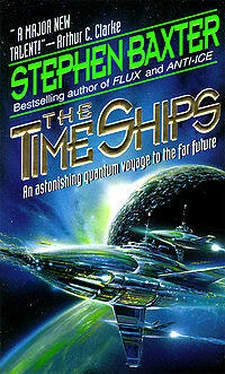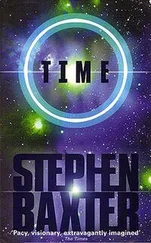“But the attempt failed,” I said, aghast.
“Yes. The engineers never returned to the earth — which was abandoned to the slow tragedy of Eloi and Morlock. And the sun was rendered unbalanced, its lifetime curtailed.”
I was horrified, and I could bear to speak of this no more. I clung to a pole, and my thoughts turned inward.
I thought again of that desolate beach, of those hideous, devolved forms with their echoes of Humanity and their utter absence of mind. The vision had been foul enough when I had considered it a final victory of the inexorable pressures of evolution and retrogression over the human dream of Mind — but now I saw that it might have been Humanity itself, in its overweening ambition, which had unbalanced those opposing forces, and accelerated its own destruction!
Our capture by the earth was elaborate. It was necessary for us to shed some millions of miles per hour of speed, in order to match the earth’s progress around the sun.
We skimmed several times, on diminishing loops, around the belly of the planet; Nebogipfel told me that the capsule was being coupled with the planet’s gravitational and magnetic fields — a coupling enhanced by certain materials in the hull, and by the manipulation of satellites: artificial moons, which orbited the earth and adjusted its natural effects. In essence, I understood, our velocity was exchanged with that of the earth — which, forever after, would travel around the sun a little further out, and a little more rapid.
I hung close to the wall of the capsule, watching the darkened landscape of earth unfold. I could see, here and there, the glow of the Morlocks’ larger heating-wells. I noted several huge, slender towers which appeared to protrude above the atmosphere itself. Nebogipfel told me that the towers were used for capsules traveling from the earth to Sphere.
I saw specks of light crawling along the lengths of those towers: they were inter-planetary capsules, bearing Morlocks to be borne off to their Sphere. It was by means of just such a tower, I realized, that I — insensible — had been launched into space, and carried to the Sphere. The towers worked as lifts beyond the atmosphere, and a similar series of coupling maneuvers to ours — performed in reverse, if you understand me — would hurl each capsule off into space.
The speed acquired by the capsules on launch would not match that imparted by the Sphere’s rotation, and the outward journey thereby took longer than the return. But on arrival at the Sphere, magnetic fields would hook the capsules with ease, accelerating them to a seamless rendezvous.
At last we dipped into the atmosphere of the earth. The hull blazed with frictional heat, and the capsule shuddered — it was the first sensation of motion I had endured for days — but Nebogipfel had warned me, and I was ready braced against the supporting poles.
With this meteoric blaze of fire we shed the last of our interplanetary speed. With some unease I watched the darkened landscape which spread below us as we fell — I thought I could see the broad, meandering ribbon of the Thames — and I began to wonder if, after all this distance, I would, after all, be dashed against the unforgiving rocks of the earth!
But then -
My impressions of the final phase of our shuddering descent are blurred and partial. Suffice it for me to record a memory of a craft, something like an immense bird, which swept down out of the sky and swallowed us in a moment into a kind of stomach-hold. In darkness, I felt a deep jolt as that craft pushed at the air, discarding its velocity; and then our descent continued with extreme gentleness.
When next I could see the stars, there was no sign of the bird-craft. Our capsule was settled on the dried, lifeless soil of Richmond Hill, not a hundred yards from the White Sphinx.
Nebogipfel had the capsule dilate open, and I stepped from it, cramming my goggles onto my face. The night-soaked landscape leapt to clarity and detail, and for the first time I was able to make out some detail of this world of A.D. 657,208.
The sky was brilliant with stars and the scar of obscurity made by the Sphere was looming and distinct. There was a rusty smell coming off the ubiquitous sand, and a certain dampness, as of lichen and moss; and everywhere the air was thick with the sweet stink of Morlock.
I was relieved to be out of that lozenge, and to feel firm earth beneath my boots. I strode up the hill to the bronze-plated pedestal of the Sphinx, and stood there, halfway up Richmond Hill, on the site that had once, I knew, been my home. A little further up the Hill there was a new structure, a small, square hut. I could see no Morlocks. It was a sharp contrast to my impressions of my earlier time here, when — as I stumbled in the dark — they had seemed to be everywhere.
Of my Time Machine there was no sign — only grooves dug deep into the sand, and the queer, narrow footprints characteristic of the Morlock. Had the machine been dragged into the base of the Sphinx again? Thus was History repeating itself! — or so I thought. I felt my fists bunching, so rapidly had my elevated inter-planetary mood evaporated; and panic bubbled within me. I calmed myself. Was I a fool, that I could have expected the Time Machine to be waiting for me outside the capsule as it opened? I could not resort to violence — not now! — not when my plan for escape was so ripe. Nebogipfel joined me.
“We appear to be alone here,” I said.
“The children have been moved from this area.”
I felt a renewed access of shame. “Am I so dangerous?… Tell me where my machine is.”
He had removed his goggles, but I could not read those gray-red eyes. “It is safe. It has been moved to a more convenient place. If you wish you may inspect it.”
I felt as if a steel cable attached me to my Time Machine, and was drawing me in! I longed to rush to the machine, and leap aboard its saddle — be done with this world of darkness and Morlocks, and make for the past!… But I must needs be patient. Struggling to keep my voice even, I replied, “That isn’t necessary.”
Nebogipfel led me up the Hill, to the little building I had noticed earlier. It followed the Morlocks’ usual seamless, simple design; it was like a doll’s house, with a simple hinged door and a sloping roof. Inside, there was a pallet for a bed, with a blanket on it, and a chair, and a little tray of food and water — all refreshingly solid-looking. My knapsack was on the bed.
I turned to Nebogipfel. “You have been considerate,” I said, sincere.
“We respect your rights.” He walked away from my shelter. When I took my goggles off, he melted into shadow.
I closed the door with some relief. It was a pleasure to return to my own human company for a while. I felt shame that I was planning, so systematically, to deceive Nebogipfel and his people! But my scheme had brought me across hundreds of millions of miles already — to within a few hundred yards of the Time Machine — and I could not bear the thought of failure now.
I knew that if I had to harm Nebogipfel to escape, I would!
By touch I opened the knapsack, and I found and lit a candle. A comforting yellow light and a curl of smoke turned that inhuman little box into a home. The Morlocks had kept back my poker — as I might have anticipated but much of the other equipment had been left for me. Even my clasp-knife was there. With this, and using a Morlock tray as a crude mirror, I hacked off my irritating growth of beard, and shaved as close as I could. I was able to discard my underwear and don fresh — I would never have anticipated that the feeling of truly clean socks would invoke such feelings of sensual pleasure in me! — and I thought fondly of Mrs. Watchets, who had packed these invaluable items for me.
Читать дальше
Конец ознакомительного отрывка
Купить книгу









